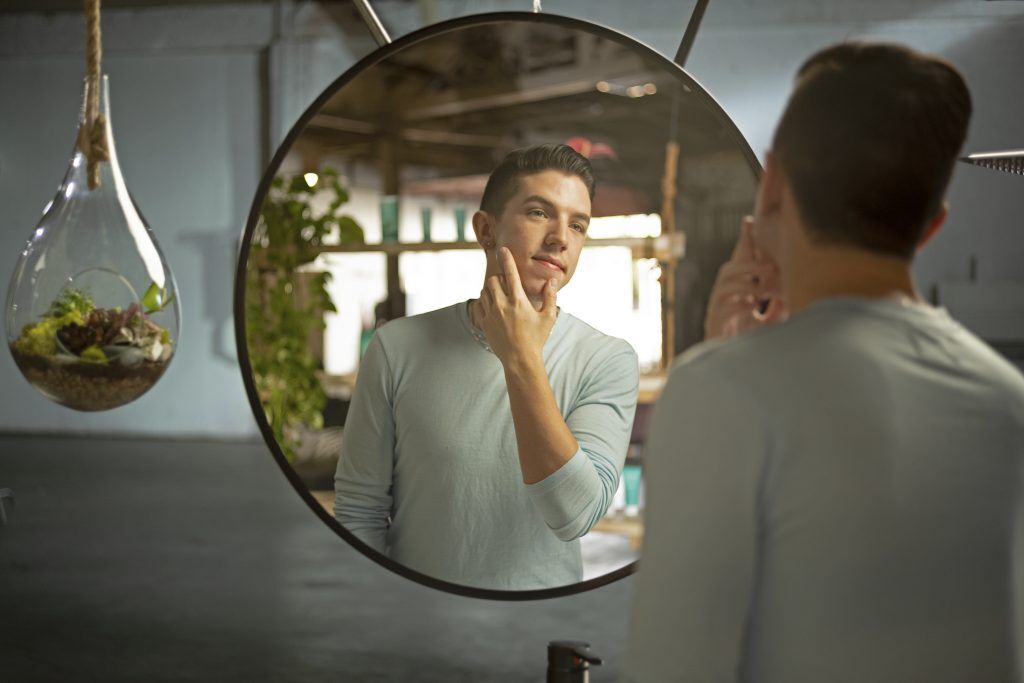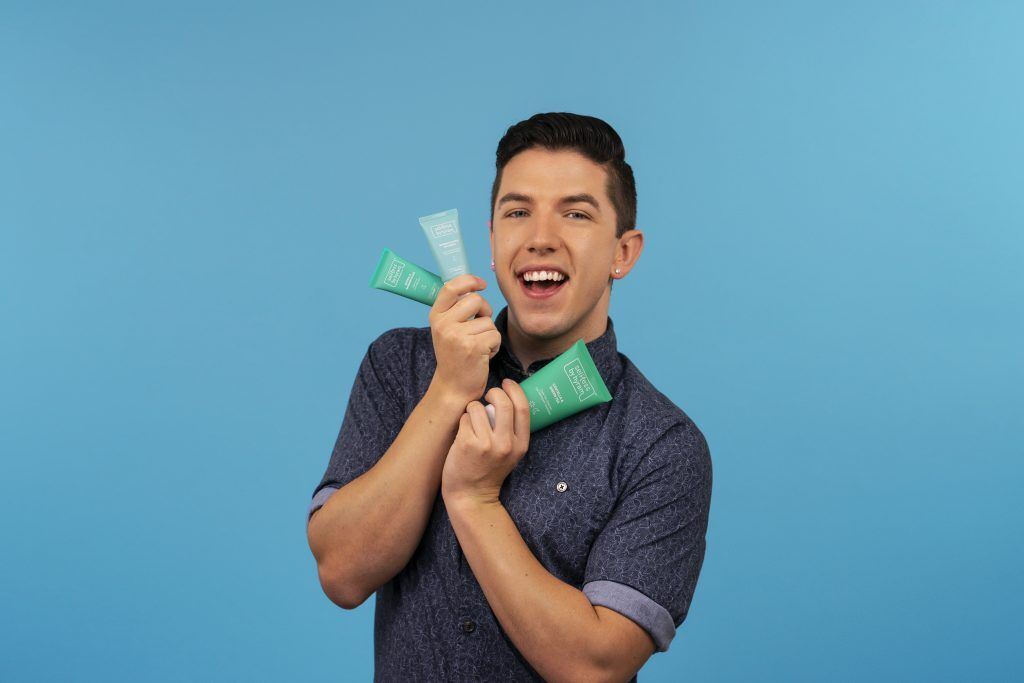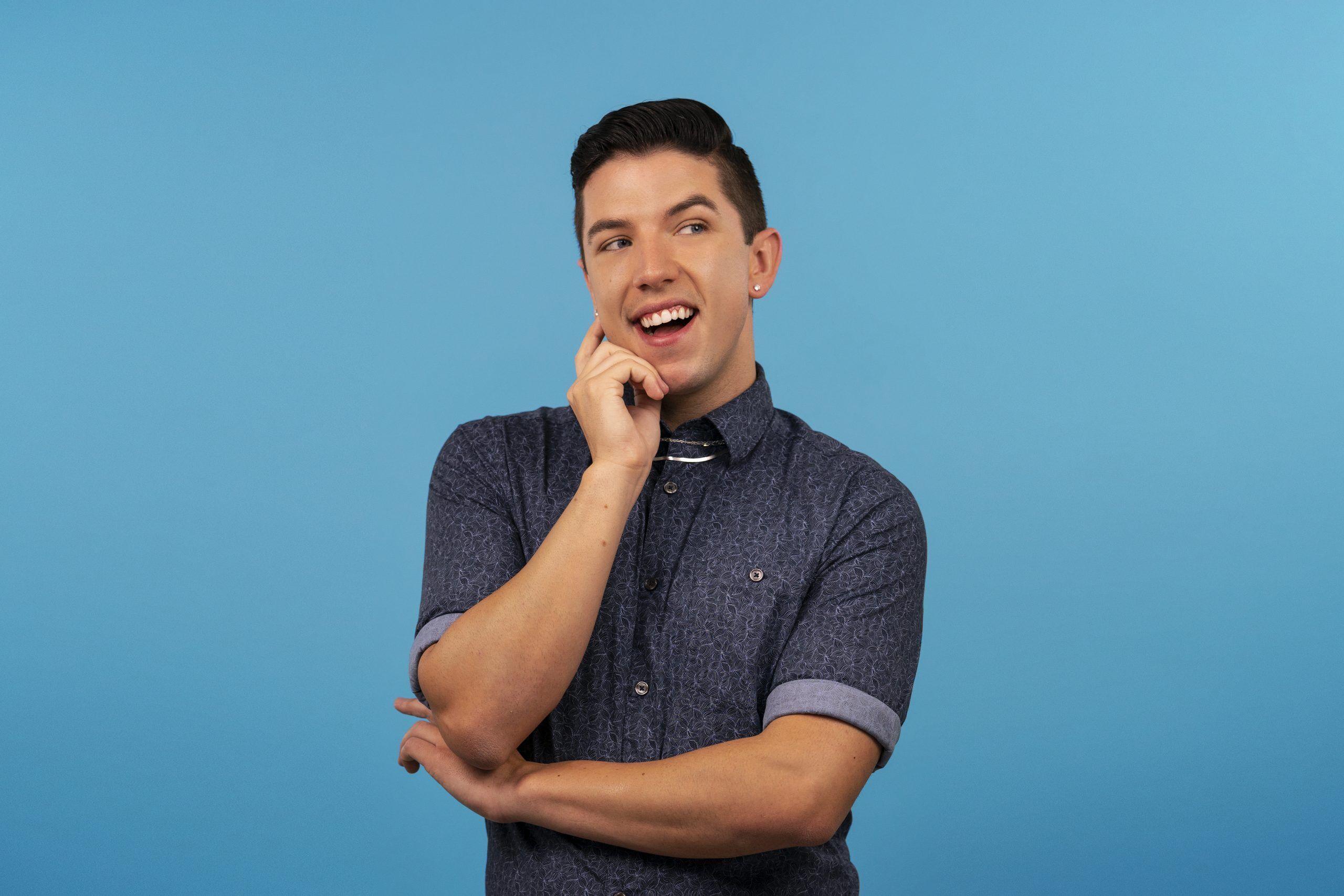CW//self-harm, suicide, eating disorders.
Let’s face it: Skincare is having a moment. Like, a five-year moment. It wasn’t that long ago that this culture believed that a skincare routine could consist of nothing more than a St. Ives scrub and some Noxema strips. Today, an entirely new philosophy of skincare has evolved out of what feels like a century of ignorance. And if you’ve ever spent time researching skincare on the Internet, chances are the YouTube skinfluencer and consultant Hyram Yarbro (known mononymously as Hyram) has not escaped your notice.
As one in a handful of visibly queer men on skincare YouTube, Hyram stands out. He’s a charming, empathetic skinfluencer who lives in Hawaii and delights audiences with his excoriating takedowns of signature products (La Mer, we’re onto you!) and his unexpected endorsement of lowly drugstore cleaners. Of all the people who are genuinely excited about skincare products on the Internet, Hyram is one of the rare few who seems interested in actually democratizing the experience. He doesn’t want to take your money: he wants to tell you how to spend in a wiser, more empowered way. And to get rid of your cystic acne, natch.
Of all the people who are excited about skincare on the Internet, Hyram is one of the few who seems interested in democratizing the experience.
Yarbro—who relocated from Arizona to Honolulu six years ago—grew up on a cattle ranch, the son of strict Mormon parents. He knew he was gay by the age of 5 or 6. But being raised Mormon posed more than a few painful problems for a young queer kid. His family’s extreme involvement in the church led Hyram to believe that he was sinful, bad, and unacceptable for being something he couldn’t control. “Faking who I was was very natural to me,” Hyram told viewers in a 2018 video titled “Growing Up Mormon.”
Middle school was even harder. He started developing crushes on boys, and though he tried his hardest to suppress his feelings, it resulted in a long course of self-harming behaviors. Yarbro struggled with an eating disorder, suicidal ideation, and cutting. “More than anything,” he explains, “I did not want to be gay.” He feared he would lose everyone he knew and loved in the Church and be left alone with his suffering. But suppressing his pain was no longer an option at a certain point. “Pain demands to be felt,” he explained to viewers after relaying the stories of his painful adolescence. He was disowned and cut off from his Mormon parents for being gay. He eventually got counseling for self-harm, moved to Hawaii, and let the emotional “floodgates” open.
But his struggles were far from over: in fact, the worst was yet to come.
In September of 2018, Yarbro tried to take his own life. This was during the first flush of YouTube fame, when viewers were starting to pay attention to the queer skincare expert who had been for so long “afraid to be authentic.” When Hyram came clean about the attempt almost 2 years later, he backed it up with a fundraiser that saw over $20,000 going to suicide prevention efforts.
Before the attempt, Hyram was being pushed to a mental health breaking point. He’d just been fired from a luxury skincare brand for not being able to sell high price point items. Then he took two jobs, with workdays spanning from 4:30am to 1am. “I’m talkin’ wet wipe shower” he told viewers. “Melatonin was my best friend.” He uploaded YouTube videos in his spare time and ended up working this grueling schedule—over 80 hours a week—for over two years.
He’s dialed it back since then, but not much. Since quarantine started, he’s been pulling all-nighters, 3/4 per week, to be precise. But on that day in September, it all came crashing down. “It was a Friday, and I didn’t have any shifts that day.” He took the bus to his favorite cafe and started doing work. It was a “productive, happy morning.” Then, he started to overthink things: The meaning of life. His purpose on earth. Usually, he would try to banish such thoughts from his head, but this time he got stuck on them. It landed him in a dark place. “You have to set up mental perimeters that you can’t allow yourself to cross,” he explained to viewers afterward. Otherwise, things tend to escalate. “Very quickly, my mind went into self-destruct mode.” Feeling no emotion, he swallowed 200 pills and immediately regretted it. “In that moment I had some clarity,” he says. He got help right away. Not wanting to burden any of his friends, he walked himself to the emergency room. He took a selfie before being checked in, and one after he was released. Sometimes he’ll still look back on those two pictures and see how “chilling” the contrast between them is. It serves as a reminder to him that things do get better, if you give it time. And that perspective makes a hell of a lot of difference.
After being released from the hospital, he fell into debt from the cost of treatment. YouTube became more and more of a focus. By 2018, viewers were flocking to hear Hyram’s take on every brand from the pricey offerings like Sunday Riley and Drunk Elephant to the buzzy Millie Bobby Brown skincare brand. Even amidst the skincare (and skincare content) boom of 2018, there was something that stood out about Hyram. Rather than trying to be the first to review a coveted new luxury product or recommend the latest $50 sheet mask, Hyram’s recommendations were based on ingredients, not marketing. He wasn’t afraid to recommend a $10 drugstore cleanser as long as it was legit. And when it came to the big, hypey stuff, he’d always tell the truth.
When I first learned about Hyram, the world was just entering quarantine. I was trying to save money and find my way out of the shopaholic debt hole I’d fallen into in the past year, when I’d let marketing and bogus claims convince me that I needed to have the newest skincare product no matter how much it cost. Watching Hyram, I found myself understanding a lot more about what ingredients actually work and what formulations are full of filler and unnecessary fragrance. I was able to see how I’d been duped previously, and thus to conquer my desire to own every new pointless mask, serum, and eye treatment that all the skinfluencers were buzzing about. Hyram helped me understand that I was chasing something that didn’t exist: the lie of “perfect skin.” Like fellow queer skinfluencer James Welsh, Hyram’s philosophy is more along the lines of gradual improvement rather than perfection. Because why strive for something that isn’t real?

Now, Hyram fans have a new reason to root for him. Pairing with the beloved, affordable brand The Inkey List, Hyram has just launched his first-ever skincare line, Selfless By Hyram, which lives exclusively at Sephora for now. The 5-product series is composed of three serums, a moisturizer, and a cleanser, and they’ve been getting pretty solid reviews from the rest of the skinfluencer community. Hyram has his detractors, but for the most part, everyone can see that he stands behind what he’s selling. The aim of Selfless isn’t just to make a profit: a part of each purchase goes to separate designated causes, like the Thirst Project, which provides clean water access to dry areas around the world, and The Rainforest Trust, which helps prevent vulnerable nature reserves from deforestation.
“We developed something that’s called the Selfless Standard,” Hyram told INTO, “which is a set of standards and expectations for ingredient suppliers to hold to in terms of sustainability, ethics, mindfulness, sourcing abilities, awareness of the natural regions, and overexploitation. When we faced a lot of these suppliers with a list of questions and wondering about all of these things, so many of them came back and said, “We have never, ever gotten any questions like this. We’ve never had any brand interested in what our sourcing process is, how sustainable we are.'”
It shows how far the skincare industry has to go, as well as how far it’s come. Hyram is focused on making sure the impact his company leaves is a sustainable one.
The entire philosophy of Selfless, he told INTO, “is finding ways that you can improve yourself and focus on helping make the world a better place every day, little by little, and that’s a constant. With this brand, and with everything I’ve spoken to on my channel, it’s always about committing to improvement. I’m so excited that the brand has also taken that stance, too. It’s been overwhelming to say the least, but in two years’ time, imagine what is going to be accomplished. Imagine the social change, imagine how the brand will develop.”
As a very future-oriented person, it’s always moving to hear Hyram speak about the more painful parts of his past. His appeal on YouTube has much to do with his signature vulnerability. The instant you see Hyram, you trust him, and you believe him. Which is, quite honestly, kind of a shock when it comes to YouTube, where new personalities seem to be manufactured by the minute.
The fact that he’s queer helps, too.
“It’s only been lately that I’ve realized, ‘Oh wow, I’m a gay man and a beauty founder in the beauty space! This is really, really cool!'”
“I think as a queer person, it’s often the goal to have it be an aspect of yourself, but it doesn’t need to be prevalent within every single conversation all the time,” he says. “For me, my goal is always to create a world where a person is able to identify as queer without having to worry about consequences, without having to worry about the implications, positive or negative. And just for it to be something accepted as normal. Something that we can be proud of, that we can speak to, but not something that needs to be a big deal.”

“I’m so glad that on my channel I’ve been able to speak to me being queer, and have open voice to be able to speak to it when I want to, and not let it be something that I either have to hide away and pretend doesn’t exist or something that I feel like I really have to highlight all the time.”
Queerness is part of his story, but not necessarily top of mind when it comes to the day-to-day operations of building a brand.
“It’s only been lately that I’ve realized, “Oh wow, I’m a gay man and a beauty founder in the beauty space! This is really, really cool! I don’t know how often this occurs.” And I think it’s such a beautiful thing that I am able to come back to myself, rather than having it serve as an obstruction.”
Now, he wants to use his experience, his knowledge, and his empathy as a queer creator to help other queer folks around the world.
“I think that’s the goal I’ve always had,” he says. “Coming from a background where being queer was absolutely not accepted whatsoever, where I lost a lot of really important relationships to me because of that factor, it’s such a relieving moment to be in this position where I don’t have to have that at the forefront of my thought every single time, worrying about my interactions, business deals, everything like that, and having it be you know a barrier to entry. We have a long way to go. But it’s really cool how far we’ve come.”
Connectivity is part of it. In the past, we all struggled with our skin problems alone, in our rooms. As adolescents, we assumed we were the only ones dealing with the pain and shame of “bad” skin, despite plenty of visual evidence to the contrary. Now, we can go online and try to find a solution. Or maybe, failing that, we can try to change our mindset. We’re living in a world where influencers can have acne and scarring. Where kids online school adults about how beauty doesn’t have to look a certain way. Where a video about moisturizers can spark a Socratic seminar in the comments.
No wonder it’s the same world that gave us access to Hyram.
“When I say YouTube has saved my life,” he says, “I truly mean it.” ♦
Help make sure LGBTQ+ stories are being told...
We can't rely on mainstream media to tell our stories. That's why we don't lock our articles behind a paywall. Will you support our mission with a contribution today?
Cancel anytime · Proudly LGBTQ+ owned and operated
Read More in Impact
The Latest on INTO
Subscribe to get a twice-weekly dose of queer news, updates, and insights from the INTO team.
in Your Inbox














